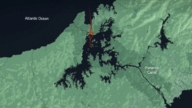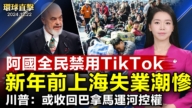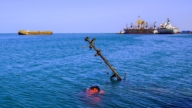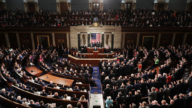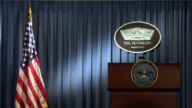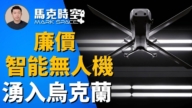【新唐人2014年05月13日訊】第24屆「東盟首腦峰會」11號落下帷幕,雖然,越南和菲律賓都曾試圖將南海主權爭議帶入峰會,但是閉幕會發表的《內比都宣言》並沒有提到中國。有分析指出,東盟存在分歧,一些東盟成員國為了維護自身利益,不希望因為南海問題,影響了與中共的關係。
5月10號,「東盟首腦峰會」在緬甸首都內比都召開,據了解,會議召開的幾天前,越南和菲律賓剛剛在有爭議性海域與中共發生對峙。
越南總理阮晉勇在會上點名中共,據《美聯社》取得的演講稿,阮晉勇指責中共在位於西沙群島的越南「專屬經濟區」內,架設一座鑽油平臺,嚴重威脅了越南的海上安全和航行自由,他呼籲東盟在會後的聯合聲明中,加入對南海問題的關注。
菲律賓總統阿奎諾三世也在峰會上提出中、菲兩國的南海主權爭議,他呼籲與會國家支持菲律賓透過國際仲裁解決爭端。阿奎諾三世還強調,南海爭議不可能單靠兩個當事國的對話來化解。
雖然越南和菲律賓在峰會上聯手攻擊中共,試圖將有關南海問題的表述塞入閉幕聲明,不過,閉幕會發佈的《內比都宣言》還是沒有提到中國。
台灣「政治大學國際關係研究中心」主任嚴震生指出,東盟10個成員國在多個方面存在分歧。
台灣政治大學國際關係研究中心主任嚴震生:「南海的主權聲索國當中,不是每一個東協國家都在裡頭。第二個,各個國家跟中國經濟互動的依存度狀況也不太一樣,有些國家可能跟中國經貿關係的密切程度,已經必須要保持跟中國友好的關係,第三個,他們對美國信任的態度,有些國家可能認為,美國在這個地方可以維持一個穩定的角色,有些可能不認為把美國扯進來,就一定能夠制衡中國(中共)。」
旅美政論家伍凡:「其實東南亞聯盟本身是一個政治集團,也是一個利益集團,但是每個人的利益不一樣,尤其跟中國的關係都不一樣,所以完全要用一個聯盟的方式來處理南海領土問題,恐怕做不到。」
中共不僅在南海有爭議性海域架設鑽井平臺,還派遣80艘軍事和民事艦船進入這個海域,撞擊越南船只,並一度向越南船只發射水炮。
在為期2天的東盟首腦峰會期間,越南首都河內等多個城市,都爆發了大規模的反中共示威集會。
嚴震生:「中國(中共)會跟越南起衝突,多多少少和越南不是美國的盟國有關,雖然(越南)跟美國關係已經改善了,但畢竟它不是像日本、南韓是美國的盟國,也不像菲律賓有特別的軍事合作關係,所以比較讓中國沒有那麼擔心美國的直接介入。」
旅美政論家伍凡指出,中共當局為了轉移目前國內民眾對經濟不佳,反腐不力等輿論壓力,需要營造「緊張局勢」。
伍凡:「會不會打戰,現在很難預料,雙方都不會讓步,中國(中共)這次是有意要把事情炒起來,所以美國人講你在挑釁,我想習近平是故意要挑釁,他就要走這個棋,他的目地第一步達到了。」
美國《華爾街日報》指出,在領土爭端問題上,中共傾向於和具體國家逐個解決,而北京的那些對手以及美國,則希望通過多邊機制來解決。但由於東盟所有決定都是協商做出,成員國很難說服組織對北京採取一致強硬的態度。
嚴震生:「過去從來沒有一個東協對南海主張統一的一個立場,因為只有部分國家跟中國有主權爭議,一半沒有,一半有,所以長期以來,他們迴避了這個問題,那現在可能就必須要處理了,但是不是能夠成功,我還是懷疑,因為你過去都沒有處理,和平的時候不處理,現在發生衝突的時候來處理,我覺的比較難。」
10號晚間,中共外交部發言人華春瑩表示,南海問題不是中國與東盟之間的問題,北京反對「個別國家」利用這一爭端,來傷害中國與東盟的友誼與合作。
採訪/朱智善 編輯/陳潔 後製/孫寧
The Association of Southeast Asian Nations (ASEAN) Declaration
Did Not Blame China to avoid Disagreement.
The 24th ASEAN summit came to an end on May 11.
The Naypyitaw Declaration didn’t mention China although
Vietnam and the Philippines had tried to bring the South China
Sea sovereignty dispute to the summit.
Some analysts pointed out that some ASEAN member countries
do not want the South China Sea issue to affect their relationship
with China and lead to disagreement.
May 10, the ASEAN summit is held in the capital of Myanmar, Naypyidaw.
It is known that Vietnam and the Philippines had just confronted
the Chinese Communist Party (CCP) in disputed waters
a few days before the meeting was held.
Vietnamese Prime Minister Nguyen Tan Dung blamed
China at the meeting.
According to the AP, Nguyen Tan Dung criticized CCP’s oil rig
in Vietnam’s exclusive economic zone in the Paracel Islands, which
is a serious threat to the security and freedom of Vietnam navigation.
He called ASEAN to add concerns over the South China Sea issue
in a joint statement after the meeting.
Philippine President Aquino III also mentioned the South China
Sea sovereignty dispute with China at the summit and called for
support to resolve disputes through international arbitration.
Aquino III also stressed that the South China Sea dispute cannot
be resolved by conversation between two parties.
The Declaration of Naypyidaw didn’t mention China although
Vietnam and the Philippines jointly attacked the CCP and tried
to insert the South China Sea issue into the closing statement.
Taiwan National Chengchi University Institute of International
Relations Director, Yan Zhensheng pointed out that the 10
ASEAN member countries have differences in many aspects.
Yan Zhensheng: “First, not every ASEAN
country wants to claim sovereignty over the South China Sea;
secondly, different countries have different economic interactions with
China, some might be closer; thirdly, different countries have
different trust in the US,
some don’t believe the US can counterbalance China."
US political commentator Wu Fan: “It’s impossible to deal with
the South China Sea issue by one union because ASEAN itself is
in fact a political group, an interest group which has different interests
and relationships with China."
The CCP not only set up a drilling platform in the South China Sea
but also sent 80 military and civil vessels into the waters to hit
and fire water cannon towards Vietnamese boats.
Large-scale anti-CCP demonstrations broke out in several cities
including Hanoi during the two-day ASEAN summit.
Yan Zhensheng: “The CCP can have conflict with Vietnam more
or less because Vietnam is not a U.S. ally although their relationship
has improved.
After all, it’s not like US allies such as Japan and South Korea;
nor like the Philippines that has special military cooperation to
possibly directly involve the US."
US political commentator Wu Fan pointed out that the Chinese
authorities need to create tension to divert people’s attention away
from the poor domestic economy and ineffective (action against) corruption.
Wu Fan: “It’s hard to predict whether there will be war because the
CCP intentionally hyped up this time.
I believe Xi Jinping attained his first target as the US said he was provoking."
US WSJ pointed out that the CCP tends to solve territorial disputes
one by one with the specific country; however Beijing’s
opponents and the US hope to address them through a multilateral mechanism.
However, it’s hard for the ASEAN member countries to take a tough
attitude on Beijing together because all decisions are by negotiation.
Upon learning that the Governor of Calif. was coming to visit,
Yan Zhensheng: “there has never been a unified standpoint on the South
China Sea from ASEAN, because only part of ASEAN has
sovereignty disputes with China.
They avoided this problem for a long time until the conflict happened.
However, I doubt if they can solve it because it’s even harder
than peace time now."
May 10 evening, Chinese Foreign Ministry spokeswoman Hua
Chunying said the South China Sea issue is not a problem
between China and ASEAN.
Beijing opposed an individual country to harm the friendship between
China and ASEAN using the dispute.
Interview/Zhu Zhishan Edit/Chen Jie Post-Production/Sun Ning



